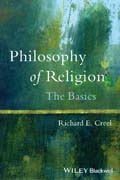
Philosophy of Religion: The Basics offers a concise introduction to philosophy of religion, distilling key discussions and concepts of the subject to their succinct essence, providing a truly accessible entry into the subject. A truly accessible introduction to philosophy of religion for beginners Takes a topical approach, starting with the nature of religion and moving the reader through the major concepts, explaining how topics connect and point to one another Offers a thorough and full treatment of diverse conceptions of God, the ontological argument, and divine attributes and dilemmas A genuinely concise introduction, this text can be used alongside other resources without overtaxing students Represents 30 years of experience teaching to undergraduates Includes a free downloadable file with key excerpts and additions to help students study INDICE: Preface for Teachers xi Acknowledgements xii Introduction 1 1 What Is Religion? 6 1.1 Creed 6 1.2 Code 7 1.3 Cult 8 1.4 Community 9 1.5 Toward a Definition of Religion 11 1.6 Ze, Zer, Mer 13 2 Six Conceptions of God 17 2.1 Experiential Sources of Concepts of God 17 2.2 Six Conceptions of God 21 2.3 Religious Naturalism 21 2.4 Pantheism 23 2.5 Panentheism (Process Theism) 25 2.6 Deism 28 2.7 Classical Biblical Theism is based on divine revelation 29 2.8 Classical Philosophical Theism 31 3 Divine Attributes and Dilemmas 34 3.1 What Is a Dilemma? 39 3.2 Ways to Respond to a Dilemma 40 3.3 Divine Attribute Dilemmas 41 3.4 Proposed Solutions to the Preceding Dilemmas 45 3.4.1 Unsurpassability 45 3.4.2 Omnipotence 46 3.4.3 Are Omnipotence and Omnibenevolence Incompatible? 47 3.4.4 Immutability and Personhood 48 3.4.5 Divine Omniscience and Human Freedom 49 3.5 Open Theism 53 4 Human Language and Talk about God 57 5 Arguments about the Existence of God 72 6 The Ontological Argument 77 6.1 Is Anselm’s Argument Decisive? 82 6.2 A Version of Duns Scotus’ Ontological Argument 83 7 The Cosmological Arguments 88 7.1 The First Three of “The Five Ways” of Thomas Aquinas 89 7.2 Paul Edwards’ Infinite Regress Argument against the Cosmological Argument 92 7.2.1 Two Criticisms of Edwards 93 7.3 The Oscillatory Theory 93 7.3.1 Criticism of the Oscillatory Theory 94 7.4 The Kalam Cosmological Argument 95 8 The Teleological or Design Arguments 101 8.1 The Anthropic Principle 108 8.2 The Multiverse 109 9 God and Morality 118 9.1 Two Arguments from Morality for Belief in the Existence of God 118 9.2 The Relation of Morality to God 119 9.2.1 The Divine Command Theory 119 9.2.2 Theocentric Ethics 120 9.2.3 Natural Law Ethics 121 10 Religious Experience and Belief in God 128 10.1 The Principle of Credulity and the Rationality of Belief in God 128 10.2 Religious Experience as Evidence for the Existence of God 132 10.3 Toward a Cumulative Argument for God 134 11 Arguments against Belief in the Existence of God 137 11.1 Evidentialism and the Burden of Proof 137 11.2 Conceptual Arguments: Analysis of the Concept of God 138 11.2.1 The Argument from Meaninglessness 138 11.2.2 The Arguments from Incoherence and Self–Contradiction 138 11.3 Arguments from Science 139 11.3.1 The Natural Sciences: The Adequacy of Science 139 11.3.2 Criticisms of Naturalism 141 11.3.3 The Social Sciences: Religion and Emotion 142 11.4 The Problem of Divine Hiddenness 145 11.5 The Problem of Many Religions 147 12 The Problem of Evil 152 12.1 G.W. Leibniz (1646–1716) 153 12.2 The Logical Argument from Evil: Arthur Schopenhauer (1788–1860) 153 12.3 The Evidential Argument from Evil: Edward Madden, Peter Hare, William Rowe 153 12.3.1 Criticisms of Arguments from Evil against the Existence of God 154 12.4 Charles Hartshorne’s Panentheist or Process Theodicy 156 13 God and Life after Death 164 13.1 Cessationism 165 13.2 Immortalism 167 13.3 Resurrectionism 170 13.4 Personal Identity and Continuity 173 14 Miracles, Revelation, and Prayer 179 14.1 Miracles 179 14.2 Revelation 182 14.3 Prayer 183 15 Rationality without Evidence 185 15.1 Pascal’s Wager 185 15.2 Evidentialism vs. the Right to Believe 187 15.3 Fideism 188 15.3.1 Faith as Action or Leap 188 15.3.2 Faith as Passion or Gift 189 15.4 Agathism, Agatheism, and Religious Hope 190 Glossary 194 Biographical Notes 203 Index 209
- ISBN: 978-1-118-61943-8
- Editorial: John Wiley & Sons
- Encuadernacion: Rústica
- Páginas: 224
- Fecha Publicación: 04/10/2013
- Nº Volúmenes: 1
- Idioma: Inglés
